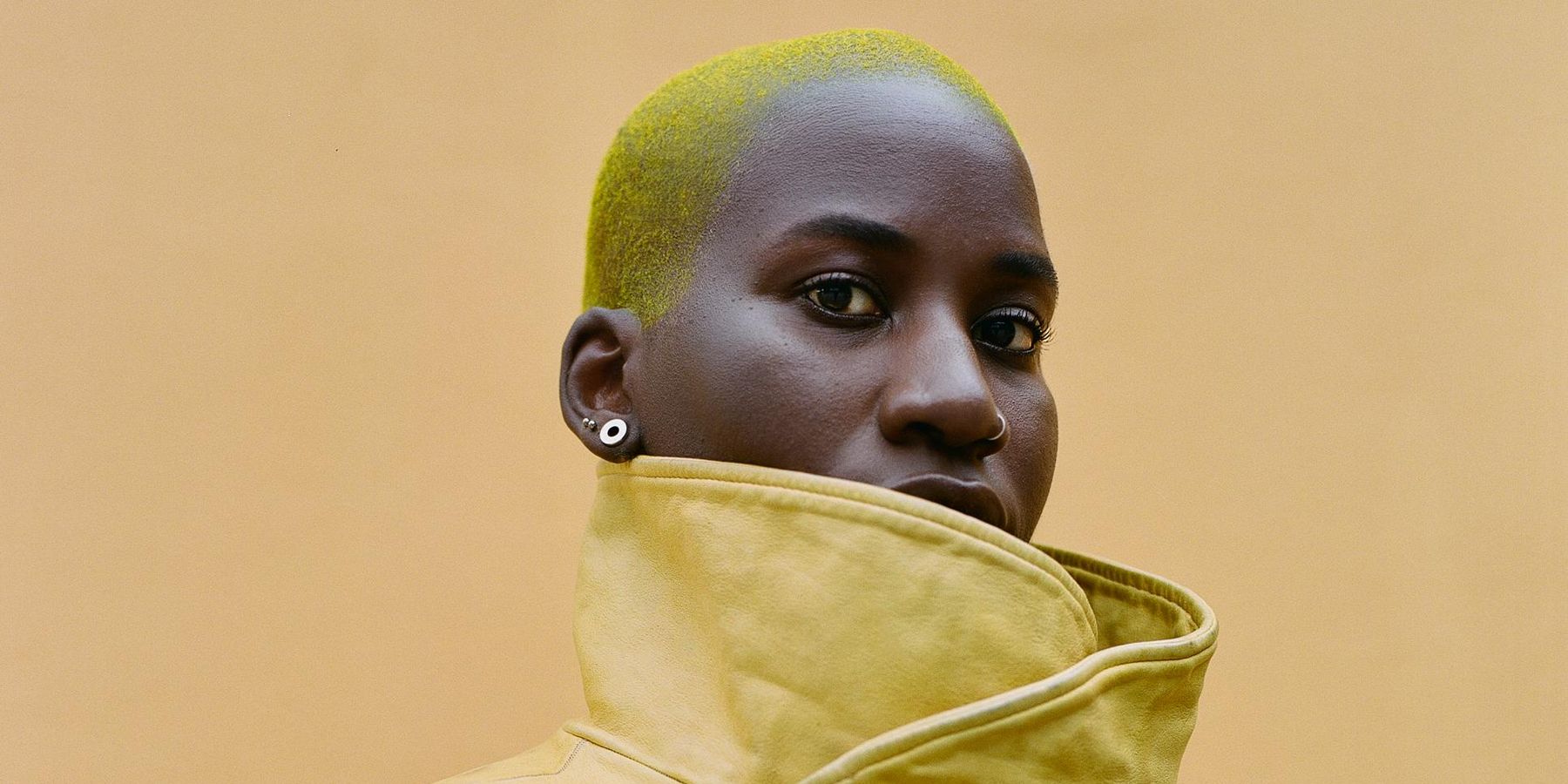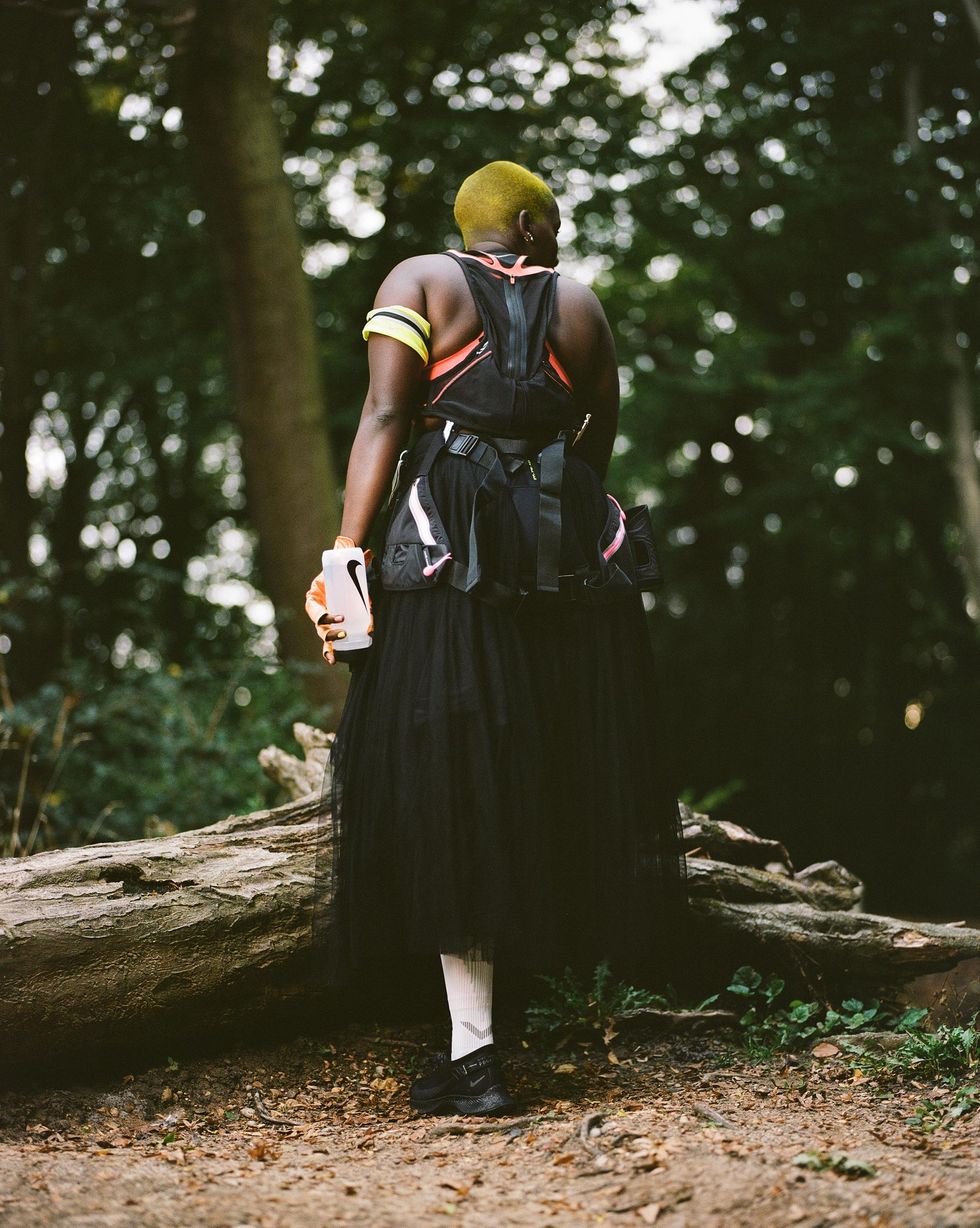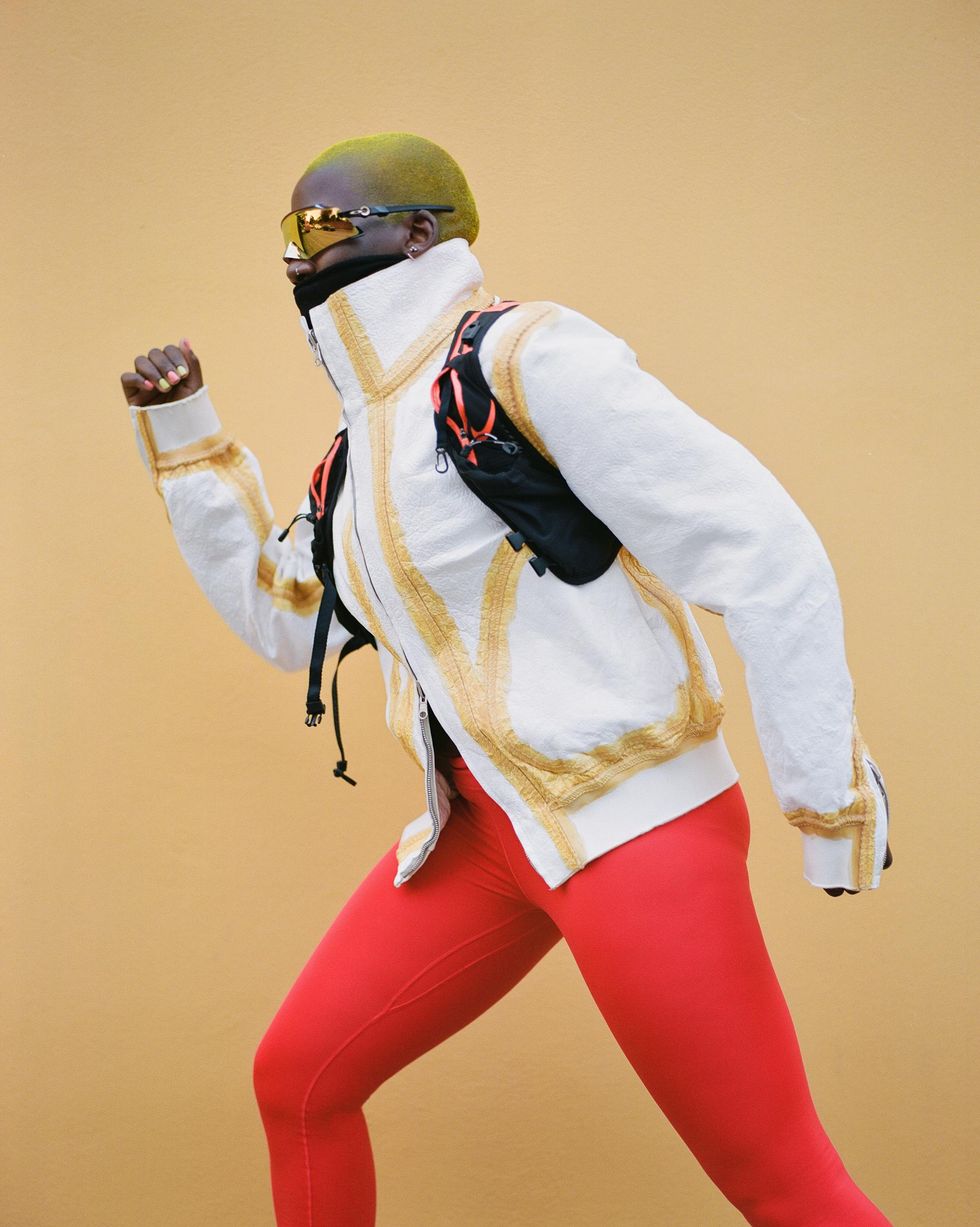
Care
Dora Atim Takes Everyone to the Finish Line
Story by Tiana Randall / Photography by Ollie Trenchard / Styling by Louis Yusef
17 December 2021

The stay-at-home order struck us all. For Dora Atim, a prestigious Nike Running Coach, the only sight of normalcy she knew during lockdown was outside. Waking up at dawn, running through grass, road and dirt, regardless of rain, sleet or snow, and pushing each mile to the end became her everyday. It's perhaps the only reason she was able to push forward.
For Atim, being given such a prestigious coaching role during a time of low performance and social interaction helped birth a miracle project: "Ultra Black Running" emerged from a place of love, serving as a vessel for Black women and gender non-conforming people to center themselves in a racially homogenous community.
"Black people around the world were in mourning," Atim says, explaining how the running club was a trauma response to the case of Ahmaud Arbery, a Black man killed while running in 2020. "We need to be heard; we need to be seen, no matter how. There's so many feelings and that's when I was like, 'I'm going to create a space for me and my girls to just go and have a run.'"
Atim made it possible to carve out an all-Black space with the support of Black femmes, because if there’s one thing Black women are going to do it's show up. "We need that space to share everything and have those Black conversations," she says. With a concentration in strength sessions, hill running and superseding distance, Atim has successfully completed eight marathons, 20 10k races and still goes for casual runs at least five times per week.
Through "Ultra Black Running," Atim wants to break down any perceived barriers that might stop someone from pursuing fitness — those I'm not fit enough, I'm too slow insecurities. By projecting the confidence she holds within, Atim's able to expand the world of running for other marginalized people and change the traditional narrative. She's nurtured this space by realizing the story already written in her head, and PAPER learns more about it all, below.

Dress: Marc Le Bihan, Gloves: Carol Christian Poell, Accessories and shoes: Nike
Running is a form of therapy and serves as an escape from problems. Did your running journey start that way or did it lead into that?
My journey with running was to get fitter. I started when I was about 18 or 19. It also had an aesthetics spin on it. I wanted to lose some weight, but I started running by boxing because my coach at the time told me it would make me fitter. It was a fight because I was sort of like, "I don't really like running and I think it's a little bit boring. So I don't know how I'm going to start this journey." But I thought I wouldn't actually lose the weight and I might actually improve in running, so I gave it a go. It was great because you can set small goals and just break them off slowly. It became more about, "What can I achieve? What goal can I unlock?"
As running becomes more meditative, I’m sure there've been a time where you’re ultra-tapped into what you’re doing during a race, hike or marathon — a moment of, “What am I doing?” How do you overcome those?
There's been so many times. I've been through races and it's always been just like that when there's extreme conditions. And I'm just sort of like, "This is not it." Just this Sunday, I was falling over in mud and literally fighting for my life because the route was something I couldn't even describe. I didn't feel powerful, I didn't feel cute, I was just doing it for pure survival and trying to get to the next point. In other races I've felt like that, I have a mantra. I mean, everyone in the UK is like, "We move." It's just the way we deal with it. Sometimes it can be an unhealthy way we deal with problems. For example, in the forest or the terrible rain, it's like, "Well, I can't sleep here. So we move."

Dress: Marc Le Bihan, Gloves: Carol Christian Poell, Accessories and shoes: Nike
What beauty lies in running?
We've seen a lot of people come together through running because of the storytelling aspect that it has. I feel my most creative when I'm running, mainly because I'm not following my thoughts, but I'm really just going through all my thought processes. But even the way I'm dressed, it's a form of expression. I just find that I'm most expressive, confident, creative and powerful.
Can you talk about regret vs. safety?
I don't think that regret has ever come across afterward. In the moment we'll say, "I don't want to stop it and keep going. I've worked so hard for this moment, or this run, or getting out the door today." And there comes a time when you literally just need to put your body first and be like, "You know what? Stop." So it could be that I'm going to stop because there's a specific pain in my body somewhere and I thought I could run through it. And actually, that's not the case, so you have to stop. Most of the time, in the moment you feel really down and crap about it. But afterwards, you think that was a good idea.
A lot of runners always have this in the back of their minds. Essentially when you start running, you want to be doing this for the rest of your life. So you have to look after your body, you have to look at yourself and be smart with your decision-making. Also, our bodies are so expensive, we have to look after it. Especially as a Black woman, the way we look at health, it's so important that I'm always talking about asking for help. I always have to go ask for help because there was a moment where if I was in pain, I'd rarely go to doctors because they'd tell me the wrong thing or overlook it. So when I say my body is expensive it's because you only have one of them.

Jacket: Carol Christian Poell, Accessories and shoes: Nike
Most of the time, we [Black people] are at the forefront of running in terms of media and accolades. But when it’s time to show up for marathons, it’s mostly white runners. Why is there such a dissonance?
With the races or the running we see on TV, I feel like it's changing. But when we look at a 4k, those races in the UK that we see are still very white. Of course, the sport is an elite sport, but who is representing is not really representing London. And with that comes access. So how can people access memberships to your clubs? How're they distributed? And how're they advertised? And again, with marathons, it's the same thing. But then it's funny because some of the best elite marathon runners are Black. We also need to see what London represents, we just need a whole mix to make it one whole big diverse sport. And that's from able-bodied athletes to Paralympians and adaptive athletes.
Nike is a great company to work with because they are giving the keys for success to so many marginalized people and putting us at the forefront. How has it been for you?
I've been working with Nike for a couple of years. It's a perfect partnership because it feels like you're given the keys and you can always ask for support. They have allowed me to tell my story. "Ultra Black [Running's]" story has been pushed on all their platforms, so that was a really surreal moment. Then they're seeing why the internal conversations are happening and as to why the spaces are being created. I'm excited to see where the future goes with my Nike partnership.

Dress: Marc Le Bihan, Gloves: Carol Christian Poell, Accessories and shoes: Nike
How do you look fresh and revived after a race? What is your beauty routine on the big day of a run?
Skincare is a huge because I'm bald, so the skin's gotta pop at all times. Especially the day before a race, I'm always in a face mask. And then on the day, same thing but with SPF because we want to be looking 21 when we're 40. Black don't crack, but you gotta make sure you take the steps for it not to crack. I always brush my eyebrows, I always have bronzer on. I just need to get that glow because when you sweat and then the sun hits, it looks fantastic. I suppose, a little bit of highlight and then no other makeup because you're literally going to be sweating it off. After the race, it's wash everything off and sit in your face mask for as long as you like and celebrate yourself because you deserve it.
Everyone feels better when they're wearing something that makes them feel good. What's in your Nike kit?
I have my essential items, so my shades. If I'm not wearing them on my face, they're always on my head. In terms of clothing, it's always the tights, the leggings. But I love print on things, I love neon colors, anything that's going to pop. I love looking like a human Crayon box.

Dress: Marc Le Bihan, Gloves: Carol Christian Poell, Accessories and shoes: Nike
There are going to be moments when you don't see the finish line or when you're running off track by accident. How do you embrace the journey that you’re on?
Finish lines are never, ever, ever promised. And neither are starting lines. One of the Nike head coaches always talks about everyone having a purpose and also celebrating yourself for getting to the start line. I always questioned celebrating getting to the starting line, but then I realized throughout the years of becoming a coach, you actually have to just celebrate it. Because, first of all, it might not happen, and in the pandemic we saw cancellations, postponements, events that never happened. We don't know if events will happen again.
Why are you making this space for Black women and nonbinary people, specifically? What power and light do you see in Black women that are reflected in running?
From an aesthetic point of view, we're so stylish. We make things look good. We've had years of being told what colors we should wear and what doesn't look good on Black skin. And now, we're just seeing so much boldness, so much bravery. Most of the time, a lot of the style influences come from Black culture. So it's like, let us influence in our natural habitat. But also I think it's super important because we talk about things that not everybody would understand. So it's important that these spaces are created. Talk about your haircare, talk about your skincare, talk about the issues you're going through. I want to relate to people when I'm running and I wasn't getting that to the fullest when I first started. Now I'm like, "This is my tribe."

Jacket: Carol Christian Poell, Accessories and shoes: Nike
Photography and art direction: Ollie Trenchard
Styling: Louis Yusef
Model: Dora Atim (@doradontexplore)
Special thanks: The Library